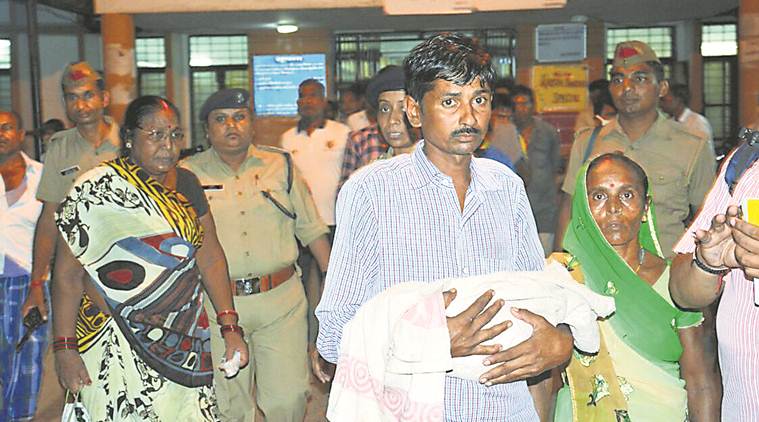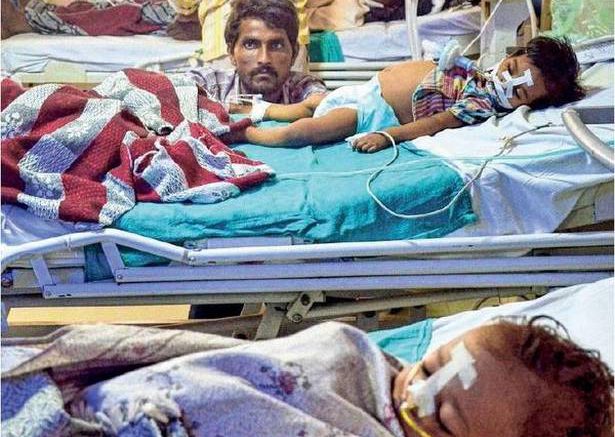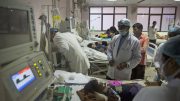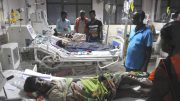Eight of 12 senior resident posts lie vacant, only three of 31 nurses are trained to handle newborns, poor parents are forced to buy disposables and consumables, and the most basic infection control norms like washing hands and use of disinfectants are not being followed.
Baba Raghav Das (BRD) Medical College and Hospital Baba Raghav Das (BRD):
Medical College and Hospital in Gorakhpur for onsite assessment of the mortality situation at the tertiary care hospital following the uproar over the death of 71 children there between August 7 and 17.
In its report submitted to the Union Health Ministry Thursday, the team, which visited the hospital on August 13, has called for a facility-based paediatric death audit.


“Currently, there is suboptimal care with regard to asepsis routines (handwashing, use of disinfectants, cleaning of bassinets after discharge or death of neonate), gross overuse of antibiotics and intravenous fluid therapy as well as poor nutritional support in form of enteral feeding… Deaths early after admission (within 12 hours) were just 11%, with 25% within 24 hours of admission and another 25-35% deaths occurring in the next 24 hours. This indicates that nearly 50% deaths are occurring within 48 hours of admission, implying both suboptimal stabilisation at peripheral units and poor care after admission in the BRD Medical College,” the report stated.
The team comprised Dr M K Aggarwal, DC-Immunisation, Ministry of Health and Family Welfare; Dr Harish Chellani, Professor and Head-Paediatrics, Vardhman Mahavir Medical College (VMMC) and Safdarjung Hospital; and, Dr Sushma Nangia, Director Professor and Head-Neonatology, Lady Hardinge Medical College and Associated Hospitals.
Vacant posts
The team found that because of vacancies, patients are left at the mercy of untrained doctors beyond office hours. “The overall strength of faculty and junior residents (pursuing MD) including non-academic JR (junior residents) seems reasonable. However, the number of senior residents (post-MD residents) is grossly inadequate being 4 against 12 vacancies and they need to be on the floor to provide 24/7 cover and not just during routine hours. It is these post-MD senior residents who take decisive actions as regards patient care and make a significant difference to the quality of care provided to patients.
Currently, the patients are managed beyond routine hours by junior residents who are themselves still students and learning to manage sick patients,” the report stated.
The team found that out of 31 nurses working in the neonatal area (for babies aged up to 28 days), only three are trained in Facility Based Newborn Care (FNBC).
The FNBC is a four-day training that is usually imparted at the state capital but can be done at BRD Hospital, followed by two weeks observership training at the National Collaborative Centre for FNBC in New Delhi. Parents of babies, the technical team found, have to buy many disposables and consumables from their own pocket though these are provided from hospital supplies to patients of Acute Encephalitis Syndrome (AES).
It is because of these systemic deficiencies that the team found that the average death rate at the hospital is no different from the days when it was under scanner in the wake of reports of disruption of oxygen supply.
“The admissions and deaths between August 1 to August 6, 2017 and that between August 7 and August 12, 2017 were not different. As per data made available by the state, it was observed that there was no increase in number of deaths in the period 24 hours before (18) and 24 hours after (11), so also the number of deaths in the period 48 hours before (36) and 48 hours after (35) the alleged period of interrupted oxygen supply (from the evening of 10th August to morning of August 11th),” the report stated.
“There was no increase in deaths in July 2017 when compared to July 2016, in fact the numbers were lower, 292 vis-a-vis 200. When a similar comparison of deaths was done between August 1-12, 2016 and August 1-12, 2017, there was no increase, in fact, it was marginally lower being 138 and 134 respectively,” the report noted.
Analysing hospital records, the report observed that there were 175 paediatric and 70 neonatal admissions with 16% paediatric and 49% neonatal deaths during August 1-6. In the period between August 7-12, there were 188 paediatric and 99 neonatal admissions with 16% paediatric and 42% neonatal deaths.
This part of the report essentially bears out Uttar Pradesh government’s contention that there had in fact been no spurt in child deaths in the tertiary care hospital that caters to eight eastern UP districts of Kushinagar, Maharajganj, Deoria, Siddharth Nagar, Sant Kabir Nagar, Basti, Ballia and Azamgarh. After the uproar over the the BRD Hospital deaths, state Health Minister Siddharth Nath Singh gave similar figures.
BRD Hospital deaths
In August 2014, 567 children died at the BRD Hospital — approximately 19 per day. A year later, in August 2015, 668 children died at the rate of approximately 22 per day and in the same month of 2016, 587 babies died — 20 per day. August 10, the day that oxygen supply was allegedly affected in the hospital, 23 children died.
The team which was also tasked with preparing a blueprint suggesting a way forward pointed out the need for the state to augment the coverage of the Japanese Encephalitis vaccine. It recommended that senior residents be appointed at salaries commensurate with their qualification for 24/7 cover and market reality, ensure implementation of standard protocol for management of sick neonates in the neonatal ICU, and organise mentoring visits for root-cause analysis and problem-solving guidance by experts. It also recommended that neonatal nursing diploma course be started to ensure availability of specialised nursing staff.
Also read:Gorakhpur hospital deaths not due to oxygen shortage





Be the first to comment on "Gorakhpur: Vacant posts, hygiene lacking at BRD hospital, notes Central team"